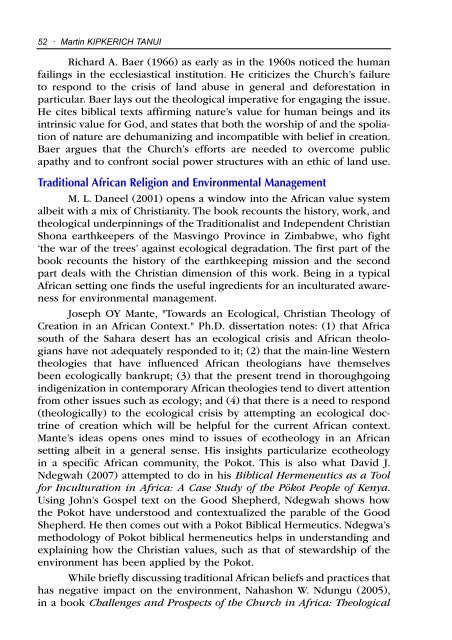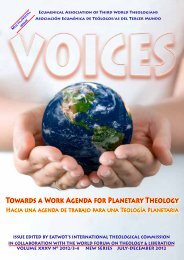voices-2013-2&3 - EATWOT's International Theological Commission
voices-2013-2&3 - EATWOT's International Theological Commission
voices-2013-2&3 - EATWOT's International Theological Commission
Create successful ePaper yourself
Turn your PDF publications into a flip-book with our unique Google optimized e-Paper software.
52 · Martin KIPKERICH TANUIRichard A. Baer (1966) as early as in the 1960s noticed the humanfailings in the ecclesiastical institution. He criticizes the Church’s failureto respond to the crisis of land abuse in general and deforestation inparticular. Baer lays out the theological imperative for engaging the issue.He cites biblical texts affirming nature’s value for human beings and itsintrinsic value for God, and states that both the worship of and the spoliationof nature are dehumanizing and incompatible with belief in creation.Baer argues that the Church’s efforts are needed to overcome publicapathy and to confront social power structures with an ethic of land use.Traditional African Religion and Environmental ManagementM. L. Daneel (2001) opens a window into the African value systemalbeit with a mix of Christianity. The book recounts the history, work, andtheological underpinnings of the Traditionalist and Independent ChristianShona earthkeepers of the Masvingo Province in Zimbabwe, who fight‘the war of the trees’ against ecological degradation. The first part of thebook recounts the history of the earthkeeping mission and the secondpart deals with the Christian dimension of this work. Being in a typicalAfrican setting one finds the useful ingredients for an inculturated awarenessfor environmental management.Joseph OY Mante, "Towards an Ecological, Christian Theology ofCreation in an African Context." Ph.D. dissertation notes: (1) that Africasouth of the Sahara desert has an ecological crisis and African theologianshave not adequately responded to it; (2) that the main-line Westerntheologies that have influenced African theologians have themselvesbeen ecologically bankrupt; (3) that the present trend in thoroughgoingindigenization in contemporary African theologies tend to divert attentionfrom other issues such as ecology; and (4) that there is a need to respond(theologically) to the ecological crisis by attempting an ecological doctrineof creation which will be helpful for the current African context.Mante’s ideas opens ones mind to issues of ecotheology in an Africansetting albeit in a general sense. His insights particularize ecotheologyin a specific African community, the Pokot. This is also what David J.Ndegwah (2007) attempted to do in his Biblical Hermeneutics as a Toolfor Inculturation in Africa: A Case Study of the Pökot People of Kenya.Using John’s Gospel text on the Good Shepherd, Ndegwah shows howthe Pokot have understood and contextualized the parable of the GoodShepherd. He then comes out with a Pokot Biblical Hermeutics. Ndegwa’smethodology of Pokot biblical hermeneutics helps in understanding andexplaining how the Christian values, such as that of stewardship of theenvironment has been applied by the Pokot.While briefly discussing traditional African beliefs and practices thathas negative impact on the environment, Nahashon W. Ndungu (2005),in a book Challenges and Prospects of the Church in Africa: <strong>Theological</strong>





